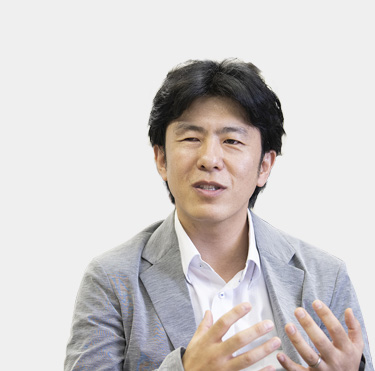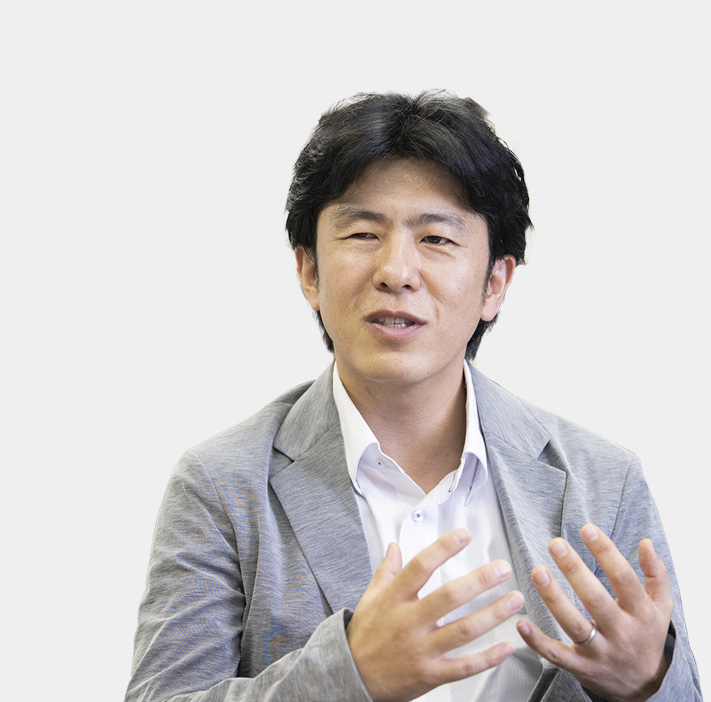03

Interview with Professor Kenki Adachi
of the College of International
Relations
This interview was conducted on July 9, 2020.

Thinking about how the education should function during the novel coronavirus pandemic.
What will International politics and Japanese society be like from now on?
What can universities do now?
Could you give the students some advice as to how we should live our lives in the post-corona world?MESSAGE
Thinking about how the education should function
during the novel coronavirus pandemic.
Do you have any opinion about the classes during the COVID-19 pandemic?
Prof. Adachi: The College of International Relations enjoys the
particularly large number of interactions with other countries. The challenge I face now is how I
could reinforce learning under the situation where we can’t freely go abroad.
Also, it is important to produce effective online classes, i.e. online classes that are equally
or more effective as the ordinary face-to-face classes. In the lecture room, I was able to get the
direct feedback from the students just by walking around in the room, which is almost impossible in
the online classes.
I try to achieve bidirectional or interactive communications with my students, such as by
giving responses to their comments in the next class.
I’ve heard that there are many overseas students in your
seminar class.
How do they cope with the current situation?
Prof. Adachi: Those who couldn’t come back to Japan stay in their
native countries and join the online classes. It’s good that you can join the overseas university
classes without travelling to the actual place: nevertheless, some students understandably miss
Japan.
On the other hand, the students who chose to stay in Japan are frustrated because they can’t go
out and have the firsthand knowledge of Japan although they are in Kyoto. The ordinary life in
Japan, which should have been the best part of studying in Japan, was taken away from those
students, and they feel very sorry for the reduced opportunities for socialization.
In order to alleviate the problem, even if only slightly, I support them in increasing the
ordinary communication opportunities by sparing a time for a chat before and after each online
class.
What do you think the advantages of the online classes?
Prof. Adachi: By observing the students, I found that they
show higher levels of comprehension on some topics in online classes than in face-to-face
classes.
Some students said that they can more actively speak up in the online classes. Because
a video of each of the classes is distributed for the on-demand classes, you can rewind and
fast-forward the video along with your pace of learning.
It may be a good idea to use the videos for students’ review of what they learned in
the future. I’m thinking about forming a hybrid class by combining the advantages of online
and face-to-face classes

What will International politics and Japanese society be like from now on?
Were there any thought-provoking topics under the pandemic?
Prof. Adachi: From the viewpoint of politics, I could focus on what
I haven’t noticed during the ordinary times ⎯ before the pandemic. Because the infection preventive
measures and the economic policy proposed by the government directly affected our way of lives, many
people felt the politics nearer to themselves and were much more interested in it than before.
During the coronavirus pandemic, we comparatively investigated into leaders and policies of
various countries. So, the pandemic gave us the opportunity to figure out the ideal leader and the
necessary measures. I expect that, if this tendency continues, it can lead to a political
improvement.
I found that the measures taken by each of the countries
during the pandemic were marked by the my-country-first policy.
What do you think is the cause for the
policy?
Prof. Adachi: Diversification of information may be one of the
causes. It is possible to direct a piece of political information to a limited number of specific
people.
Because SNS is used as a political tool nowadays, it has become easier to win power by
formulating a policy to the benefit of a certain group of people. Such a change became the driver of
the my-country-first policy under which all you care about is your country.
Having said that, when you want to transmit novel coronavirus-related information, you can’t
manipulate the information as you do in sending fake information. In this sense, the spread of novel
coronavirus will make it impossible to gain power by sending fake or false information to a certain
group of people using SNS.
So, I hope the novel coronavirus pandemic will be the motivator for all the people around the
world to give up acting for a small area and to recognize the importance of achieving unity with a
global perspective.
What do you think Japan has to do next?
Prof. Adachi: The novel coronavirus is a cross-border,
international issue. Because many countries have been inclined to the my-country-first policy, I
hope that Japan will be the leading country to promote and reaffirm the significance of the
international cooperation.
I suppose you know the idea of “human security” for protecting human lives. Japan started to
push forward with the idea from the end of 90s and has been recognized as the leading country in
this field. Further, the viewpoint of realizing the world that “leaves no one behind” held out in
the SDGs is closely linked to the human security and is considered to be very important in the
international community.
Japan will be required to encourage other countries by leveraging the experience of taking the
leadership in the field. Also, the process of containing the novel coronavirus while protecting the
freedom and rights of citizens, which is called the Japan model, is attracting international
attention.
I think there is a room for Japan to exhibit the leadership in developing a strategy for
combating with the novel coronavirus while protecting the democracy, human rights,
freedom, and so forth.
What can universities do now?
Could you give the students some advice as to how we should live our lives in the post-corona world?
Prof. Adachi: Even when the coronavirus pandemic ultimately
comes to an end, the world will not be restored to the former state. Naturally, those who
can cope with the new era to come will survive.
You, the students currently enrolled at the university, are of digital native
generation, have been exposed to an enormous amount of information, and therefore are
capable of flexible way of thinking.
I’m sure that you can amass strength for creating something new by thinking deeply
about what you can do now. Particularly, many of you studying at the College of
International Relations want to work internationally.

At the moment, you might be frustrated because you have to refrain from going out, but please
effectively utilize this situation as the preparation period for a profound learning experience.
In fact, if you study abroad without preparing for it, what you’ll learn can be very limited.
There are many things to learn in a country foreign to you, but some of them just remain out of your
reach if you don’t know anything about it in advance.
So, I’d like to advise the students planning to challenge abroad to conduct a great deal of
preparatory study. It is important to do what you can do now and learn what you have to learn now,
while avoiding to think in a way that limits your possibilities.
What you have learned will be the wealth you can rely on for surviving the post-corona world
and might serve as a springboard for your success.
How do you want the students to utilize the university?
Prof. Adachi: One of the values of a university is that you have
accesses to various kinds of information and you can nurture the ability to understand the
information. The other is that you can easily create a network because the people of your generation
gather at a university.
The network you built in your college days will help you very much after graduation. It is now
a bit difficult to create a new community because of the online-oriented classes, but some of the
communities can be created via online, or you might find that a certain a type of community can be
created only via online.
I hope you make use of the university as an academic playground where you can expand your
network and knowledge.
Perhaps making friends with students from different academic fields is actually one of the appeals of a university.
Prof. Adachi: It is a very precious experience to connect the
knowledge of your academic field to a different one, thereby to expand a horizontal intellectual
communication network. It will be increasingly important to nurture the ability to find an answer to
a question with no definitive answer or to an unanswered problem.
I hope the students will be inspired by the professors to learn the technique of finding such
an answer by nurturing the ability. In the post-corona world, you will be questioned if you can do
what others can’t, or if you have your own specialty. Please expand your knowledge and cultivate
comprehensive ability to start searching for “what only you can do”.
Message
Profile
Professor Kenki Adachi specializes in international politics,
arms reduction and control
theory,
global governance theory, and civil society theory.
 MORE INFO
MORE INFO
Other articles



